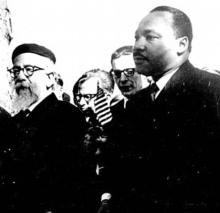Today in America we celebrate the life and works of Dr. Martin Luther King Jr., the most iconic civil rights leader of our nation in the 20th century. Though Dr. King is remembered for his stirring speeches and his tireless, grassroots campaigning efforts to demand equality and social justice in America and throughout the world, his real power was in his ability to forge alliances between people who had never worked together before. King was ever-mindful of his political actions and how exactly to create ripples through the media and through whole communities. This is how Dr. King's civil rights movement came to include the American Jewish community.
Jews have always been involved in American civil rights, from the epistolary discourse between Rabbi Isaac Mayer Wise and Abraham Lincoln, to the Suffragist efforts of Gertrude Weil and Ernestine Rose, to the modern-day defenders of the ACLU. In the 1960's Jews became allies of African-American citizens seeking an end to discrimination under the law and in common practice. Up until his life was tragically cut short in 1968, some of Dr. Martin Luther King's most prominent, vocal supporters among white Americans were Jews.
Though Jews had been involved with African-American rights to some extent previously, the event that thrust American Jews and blacks into the same fight for equality was the 1958 bombing of Temple-Hebrew Benevolent Congregation, a synagogue in Atlanta, Georgia. The attack was in response to the presence of Jewish supporters in integration efforts in the South. Shortly after the attack, Dr. King openly forged a partnership with Rabbi Jacob Rothschild of THBC. Rothschild became one of the most prominent white supporters of African-American rights in the nation. Seven years later, Rabbi Rothschild organized a banquet at the Dinkler Plaza Hotel to honor Dr. King's recent receipt of the Nobel Peace Prize. It was the first racially integrated banquet in the American South and it was attended by over 1400 people.
Dr. King also found a staunch ally in the famed Rabbi Abraham Joshua Heschel, a leader not only in the Jewish community but a vocal supporter of equality across the globe. Of the plight of black Americans Rabbi Heschel once said, "How can we love our neighbor when we flee from him and leave him abandoned, congested in the neglected ghettos of the inner city?"
Most famously, Rabbi Heschel marched beside Martin Luther King Jr., quite literally, in the Selma to Montgomery demonstration of March 1965. The demonstration was in response to violence against black voters attempting to register in the state of Alabama. This was no mere symbolic gesture. The march took three attempts, the first two ending in outright assault on the demonstrators, and the 51-mile hike lasted for five straight days. Jewish supporters of the American civil rights movement were not just writers and orators, they were among the many who put themselves in harm's way to achieve justice.
